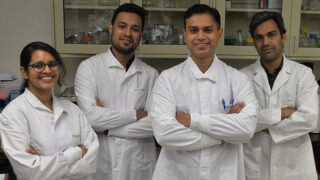Areas of Study
Tuberculosis
Education
- Universidade de Lisboa2009PhD
- Madurai Kamaraj University2003MSc
- Orissa University of Agriculture and Technology2000BFSc
Research
We are interested in investigating the host-pathogen interactions that determine the protective vs pathological immunity during Tuberculosis infection. Tuberculosis is a serious infectious disease caused by the bacterium Mycobacterium tuberculosis, which usually infects the lungs but can also infect the kidney, spine, brain, and other parts of the body. According to the Center for Disease Control and Prevention, the number of TB cases reported in the United States increased for the first time in over ten years in 2015, after having declined from 1993-2014. Despite having screening and treatment for TB, the emergence of drug resistance in the tuberculosis bacterial strains has once again made it a significant threat in the United States and worldwide. The development of preventive measures for TB as well as treatments for drug-resistant strains is, therefore, imperative to prevent the global spread of drug-resistant TB. However, there are still major aspects of the disease’s progression that are not fully understood, which inhibits such innovations. To design novel therapies and prevention methods, we must first understand the fundamental process of the bacteria-host interactions, and the differences in these interactions that lead to disease progression as opposed to its containment by the host immune system. We strive to understand these fundamental questions of TB pathogenesis. Our overarching goal is to uncover novel therapeutic nodes of intervention in human TB and identifying reliable biomarkers that can predict the risk of developing disease.
Our previous work in various mouse models of chronic tuberculosis infection suggested that the ability of the host to control the tissue damaging inflammation comprise a key attribute of protective immunity to TB. We have identified IL-1 as a critical determinant of this pathological inflammation that recruits neutrophils to the infected tissue and supports the bacterial growth in these specific inflammatory sites. Neutrophils comprise the first line of defense against many bacterial pathogens including M. tuberculosis. However, uncontrolled recruitment of these cells to the site of infection is detrimental during chronic TB infection. We and others have shown that neutrophil numbers correlate positively with the severity of inflammatory TB both in mice and humans. Since these cells are an integral component of protective immunity for many other pathogens, why do they play a pathological role during TB? How do the bacterium manipulate the inflammatory response to pump in more of these cell types to the site of infection to cause tissue damage that not only impairs the lung function but consequently supports the replication of the pathogen, is currently unclear. We are interested in addressing these questions by employing a broad array of biochemical, immunological and in vivo imaging approaches.
Our laboratory is interested in characterizing both the host and pathogen factors in modulating host defense during TB. We use novel mouse models such as M. tuberculosis strain 18b infection model (Mishra et al., Nature Immunology) to study the contribution of host factors to inflammation and tissue damage (independent of antimicrobial effects) during TB, and transposon deep sequencing based high throughput bacterial genetics (Mishra et al., Nature Microbiology) approaches to study the contribution of various pathogen factors in modulating host immune responses and alter disease pathogenesis. Various single and double knock out mouse models, mice with cell specific knockouts of key immune factors, will be employed to study the interplay of host and pathogen factors that shape the outcome of this chronic infection.
Publications
View Bibhuti B. Mishra's articles on the National Institute of Health's PubMed website.
